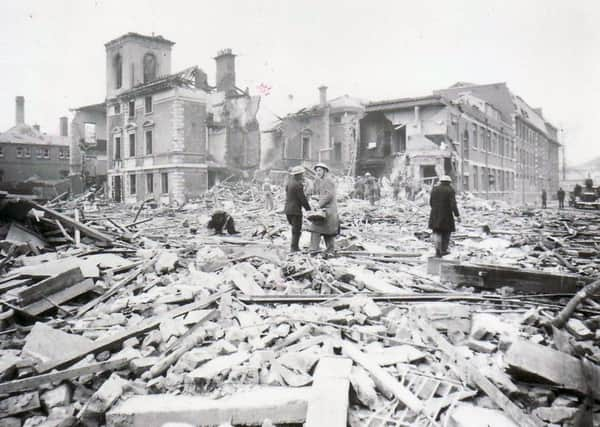How the NHS was bornout of a blitzed Britain


Homelessness was rife, millions lived in squalor, education was poor, unemployment was high and the country was plagued by ill health.
The country had also been ravaged by the Second World War and was struggling with continued austerity measures.
Advertisement
Hide AdAdvertisement
Hide AdIn Portsmouth, the Royal Portsmouth Hospital off Commercial Road had been hit three times during the Blitz.
Although patients were evacuated safely, several male members of staff and a special constable were killed.
The hospital, opened in 1849, served the majority of the city treating children and adults with a range of illnesses.
Across the harbour, Gosport’s Royal Hospital Haslar cared for armed forces personnel both in war time and during peace.
Advertisement
Hide AdAdvertisement
Hide AdThen in 1948, the year the NHS began, another hospital opened to serve the Fareham area.
St Christopher’s Hospital, on Wickham Road, mostly dealt with older patients. It was a community hospital for people needing both short-term and long-term healthcare.
Meanwhile, the rest of the country was in dire need of support and economist William Beveridge’s proposals for a new welfare state to tackle the ‘Five Giants’ were met with great enthusiasm by the public and politicians alike.
The political climate was shifting too, and despite leading Britain to victory in the War Winston Churchill and his Conservative government lost by a landslide in the 1945 general election to the Labour party, led by Clement Attlee.
Advertisement
Hide AdAdvertisement
Hide AdThe war had brought free healthcare to all and in light of Beveridge’s welfare report the general public wanted it to continue, as well as the other social reforms proposed by Beveridge.
They trusted Attlee’s Labour party, and his Health Secretary, Aneurin ‘Nye’ Bevan, to deliver a new welfare state.
The idea for a national health care service was simple yet wildly ambitious – free, universal and comprehensive healthcare for all at the point of delivery. Rich or poor, man or woman, young or old – the NHS would bring good healthcare to every person in the country.
Through taxation, it was planned to group hospitals, doctors, nurses, pharmacists, opticians and dentists together for the first time as part of a nationwide nationalisation.
Advertisement
Hide AdAdvertisement
Hide AdBut his dream was not without its opponents, though, and Bevan was met with fierce opposition by the British Medical Association and doctors and dentists who wanted to continue charging privately per patient instead of receiving a Government salary.
Their threats to boycott the NHS continued as late as February 1948.
However, Bevan’s National Health Service Act was passed in 1946 and officially came into force on July 5, 1948.
Park Hospital in Manchester would play host to the symbolic nationwide opening of the NHS and become the inaugural site of the first NHS hospital in the UK.
Advertisement
Hide AdAdvertisement
Hide AdThere, nurses formed a welcome line for the father of the NHS, Bevan, as he was given the keys to officially open Park Hospital.
At 13 years old, Sylvia Diggory (nee Beckingham) became the first ever NHS patient.
Diggory later recalled: ‘Mr Bevan asked me if I understood the significance of the occasion and told me that it was a milestone in history – the most civilised step any country had ever taken, and a day I would remember for the rest of my life, and of course he was right.’
Bevan’s NHS was a milestone moment as it was the biggest act of social welfare reform the country had ever seen.
Advertisement
Hide AdAdvertisement
Hide AdBy 1950, 17 million people across the UK received NHS-provided glasses and nine million were given false teeth. Many killer diseases like TB, polio and diphtheria were also wiped out.
Years later and the NHS has been at the forefront of major medical, scientific, clinical, technological and workforce advances and breakthroughs.
It is one of the biggest employers in the world, employing 1.5 million people, treating one million patients every 36 hours.
And although it may have changed since Bevan’s original blueprint for a national health service, it still delivers the same exceptional, universal, free healthcare for all.